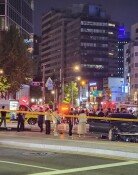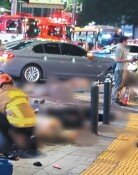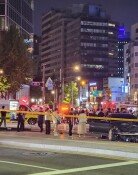Ensuring justified use of public authority is necessary
Ensuring justified use of public authority is necessary
Posted August. 11, 2023 07:52,
Updated August. 11, 2023 07:52
The recently aired TV series “Shadow Detective” delves into the stories of police officers whose destinies pivot based on their use of firearms. The central figure, Kim Taek-rok, a police officer, apprehends a notorious criminal but faces a three-month suspension for discharging his weapon. When confronted by a hostage-taker targeting his daughter, Kim hesitantly draws his gun. This, indeed, reflects the challenges numerous Korean police officers confront today.
On July 21, a violent stabbing spree occurred at Seoul’s Shillim Station, resulting in four civilian deaths. Over the subsequent two weeks, the nation was gripped by fear due to impending “murder warnings.” On August 3, another man launched a car attack and stabbing rampage at Bundang’s Seohyeon Station, leaving 14 casualties. Citizens found themselves perpetually vigilant outdoors, wondering what has befallen Korea, which once prided itself as the “safest country in the world.”
“Shadow Detective” offers a potential explanation. As illustrated by Kim, Korean police officers grapple with concerns over potential repercussions for firearm use when colleagues are endangered. The human rights of the wrongdoers often overshadow their commendable efforts in apprehending dangerous criminals. Altercations arise over firearm usage during drug cartel raids, while the protagonist agonizes over overdrawing his weapon against a hostage-taker aiming at his daughter. The series paints a stark picture of the current struggles faced by Korean law enforcement while attempting to exercise public authority. While the public authority was stalling, random assaults and murder warnings surged within Korean society.
The government’s steps to revamp the system and ensure legitimate preemptive action against murder warnings and stabbing rampages are welcome, though they appear somewhat delayed. Nevertheless, frontline police officers remain skeptical of the government’s intentions. Utilizing force under governmental assurance only for a suspect to be injured or killed might lead to criminal charges or civil lawsuits. Approximately ten cases have seen police officers held accountable for excessive use of public authority, resulting in criminal penalties or civil reparations. Consequently, police advocates demand safeguards for the justified use of force during duty.
There must be a balance between controlling the misuse of public authority and safeguarding suspects’ human rights. However, the time has come to heed police officers who express apprehension about using force amid emergencies due to fear of legal repercussions. Ensuring legitimate exercise of public authority is crucial to shielding innocent civilians from heinous crimes. The government and the National Assembly must heed the concerns of countless police officers on the front lines of duty.







